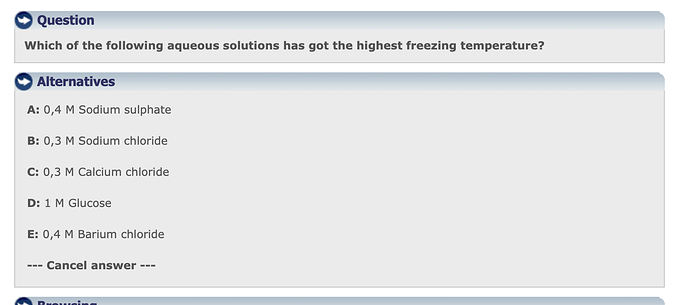Hi!
Normally freezing point depends on concentration and not the nature of particles
the lower the concentration, the higher the freezing point
Between B) and C) i would choose B) since it has the lowest Van’t Hoff factor
I would love to have someone else’s input on this!
Hey! Mind including the answer?
Let’s solve this step by step! ![]()
![]()
![]()
Step 1: Freezing Point Depression Concept
- The more particles (ions or molecules) dissolved, the lower the freezing point.
- The solution with the fewest particles will have the highest freezing temperature.
Step 2: Calculate the number of particles (van’t Hoff factor, i) for each:
- A: Sodium sulphate (\mathrm{Na_2SO_4}): 0.4~\mathrm{M} \times 3 = 1.2 (Na+, Na+, SO4 ^2-)
- B: Sodium chloride (\mathrm{NaCl}): 0.3~\mathrm{M} \times 2 = 0.6 (Na+, Cl-)
- C: Calcium chloride (\mathrm{CaCl_2}): 0.3~\mathrm{M} \times 3 = 0.9 (Ca^2+, 2Cl-)
- D: Glucose (\mathrm{C_6H_{12}O_6}): 1~\mathrm{M} \times 1 = 1 (does not dissociate)
- E: Barium chloride (\mathrm{BaCl_2}): 0.4~\mathrm{M} \times 3 = 1.2 (Ba^2+, 2Cl-)
Step 3: Identify the highest freezing temperature
- The solution with the lowest total particles will have the highest freezing point.
- B: 0.6 is the lowest.
Final Answer:
B.0.3 M sodium chloride
